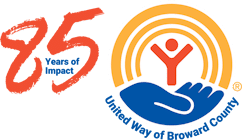The lifeblood of our community are our ALICE families and individuals —
Asset Limited, Income Constrained, Employed. ALICE workers educate our children, keep us healthy, keep our money making industries running and make our quality of life possible, yet do not earn enough to support their own families. ALICE households are one unexpected situation away from financial crisis and forced to make tough choices, such as deciding between quality child care or paying the rent. If a paycheck or two are missed, ALICE worries how they’ll feed their family, or how they will be able to pay the rent-those are among the many things they face every day. And COVID-19’s threat to both health and jobs has truly highlighted their economic vulnerability.
The release of the 2020 ALICE report coincides with the COVID-19 pandemic. The data shows that the number of ALICE workers continues to remain high at 37% in Broward County, with 13% living below the Federal Poverty Level (FPL). COVID-19 has greatly impacted the industries where ALICE is employed–tourism, personal services, retail, and food service. As of April 29th, Florida’s Department of Economic Opportunity has received 916,002 unique unemployment claims. Of which only, 427,566 have been approved since March 15, and 266,201 have been rejected. With scores of ALICE families unable to work and unable to access unemployment benefits, they are turning to our non-profits and safety net systems for support.
While we will not know the full picture how of COVID-19 has impacted ALICE for many months, we see what their needs are and how the community has come together to provide support. Since late March, 211 Broward has received more than 6,000 calls for food, emergency financial assistance, and mental health services. United Way of Broward County has provided funding for increased food distribution and rental/utility assistance. As a community, we must continue to advocate for increased federal allocations for rental and mortgage assistance to prevent homelessness, access to food and to behavioral health services. Philanthropy alone will not be able to help everyone in need and while the CARES Act is a wonderful jumping off point for assistance, ALICE will need access to long-term support.
We all know someone who is ALICE or we ourselves are ALICE. Only together will come out on the other side of COVID-19 healthy and thriving.
To view the 2020 ALICE report click here.
© 2023 United Way of Broward County | 1300 South Andrews Avenue, Fort Lauderdale, FL 33316 | 954.462.4850 A copy of the official registration and financial information may be obtained from the division of consumer services by calling 1-800-435-7352 within the state. Our Registration number is CH536. Registration does not imply endorsement, approval, or recommendation by the state. UWBC does not use paid solicitations and 100% of each contribution is received by UWBC.

